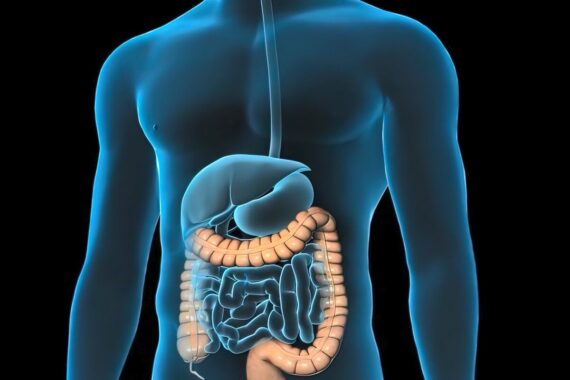Exclusive GPs have raised concern about a new colorectal cancer pathway aimed at reducing referrals into one of England’s largest acute hospital trusts.
The pathway was implemented in December 2022 to tackle long waiting lists at United Lincolnshire Hospitals Trust (ULHT) by reducing the number of referrals from primary care.
But the Lincolnshire LMC and Primary Care Network Association both raised concerns about the pathway and its impact on general practice in a letter to their ICB earlier this month.
They said GPs across Lincolnshire are concerned both about the increased patient risk and the workload placed on practices, which is based on new FIT guidance introduced last year.
Medical director of Lincolnshire LMC Dr Reid Baker said when the new pathway went live ‘it became very apparent to general practice colleagues that this process was putting barriers in place’.
The ACPGBI and BSG guidance, which differs from the NICE NG12 guideline, means that patients below a certain FIT threshold should not be referred to secondary care unless a GP has other clinical concerns.
Dr Baker said ULHT’s new colorectal cancer pathway, which suggests GPs put patients onto an advice and guidance (A&G) pathway if under the FIT threshold, is ‘strongly based on’ this guidance, but ‘is not perfectly in tandem with it’.
The main concern highlighted in the letter was the increased risk to patients, for example if patients who have cancer but return a negative FIT result are not put on the cancer pathway in a timely manner.
The letter’s authors, Dr Baker and chair of the PCNA Dr Sadie Aubrey, acknowledged the need to reduce waiting lists in secondary care, but called on the ICB to review the pathway to ensure general practice does not bear too big a burden.
Dr Baker said: ‘The increased workload is a concern because it’s reflective of a sense in Lincolnshire general practice, and potentially across the country, that there will be a further shift of workload, delay, and inherent risk into general practice as trusts try to resolve the backlogs which understandably increased due to the pandemic.’
The letter also expressed concerns that the new pathway could exacerbate health inequalities in the area since getting the ‘4 Fs’ completed, which is required before referral, ‘will be most challenging for the most vulnerable in our population’.
Another worry is GPs’ ‘lack of confidence in A&G services’ due to the potential for delayed responses from secondary care colleagues, according to the letter.
Dr Baker said there needs to be work around A&G to ensure ‘it can function optimally for everyone in the system’ and that general practice does not ‘hold the additional workload unresourced, and particularly any additional risk that comes from holding those patients in the community’.
He also highlighted the importance of respecting GPs’ ‘experience and clinical acumen’ when making decisions about referrals, even if a patient returns a negative FIT result.
The LMC and PCNA’s letter from 1 February requested the ICB to review the pathway at the Primary Care Advisory Group and ICB Strategic Board. They have not yet had a response.
Pulse contacted Lincolnshire ICB and ULHT but they did not provide comment.
According to guidance published last year, FIT should be a triage tool to help determine whether to refer patients under a ‘fast-track’ CRC cancer pathway.
If patients have symptoms but do not meet the criteria for urgent referral, they can potentially be managed in primary care.
Pulse October survey
Take our July 2025 survey to potentially win £1.000 worth of tokens















It is worth noting that national guidance says “Referral policy and guidance
The following are national requirements for management of urgent suspected cancer (including non-specific symptoms) and breast symptomatic referrals: • If a consultant thinks the referral is inappropriate this should be discussed with the referrer. Only the referrer can downgrade or withdraw a referral. This includes where it is considered that insufficient information has been provided. “
The *actual point* of Advice and Guidance is to block referrals and shift workload out of hospitals and into general practice, whilst hospitals keep the attached funding as they now operate on block contracts.
A sensible alternative would be for the (generally well funded) hospitals to just get on and deliver on their contract by doing their own workload. Their wards may be full but there is no good reason that their outpatient departments aren’t back working at pre-covid levels, especially with the huge sums of taxpyer ‘recovery money’ they have received.
Instead, they are trying to make their problem (poor productivity and huge waiting lists) our (general practice’s) problem.
The do the same with finance, by regularly overspending and making it NHSE’s problem.
The problems with hospital culture and management, indulged and even encouraged by NHSE, are the reasons the NHS is currently circling the plughole.
In reality you just look for the symptoms that mean FIT test is not required, so they still go on the 2WW pathway !
13 February, 2023 7:31 pm
In our patch a 2ww referral meeting all the effin criteria has a phone assessment with a physicians associate at 6weeks prior to a colonoscopy a few weeks later. With no comms from their secondary care team they repeatedly book to see us, we chase up and hear nothing.
If their scope is normal, despite ongoing pain, bleeding, weight loss and bloating – they are discharged by letter back to GP “to consider further investigation” having never met a surgeon.
Surely our consultant colleagues haven’t sanctioned or helped design this?!
It only results in one thing – patients facing a delay in treatment and attending A&E in desperation.
Criminal.
May as well cut out the middleman and refer straight to PALS